Are you Complaining for Noise or Complaining for Change?
Creating a positive environment of productivity and effectiveness is cultivated from within, using the most powerful tool we possess as humans – our voice.
We most likely have all heard of it- “The no complaining rule.”
But, do we actually embody it?
What does it even mean?
Complaining comes naturally and most humans complain often without every realizing. The three most common topics to complain about:
- The weather
- Travel
- Expenses
Maybe these are the easiest to complain about, simply because we can’t control them. We all deal with bad weather. We all experience travel delays. We all have to pay bills.
The following excerpt is taken from Rich Pierson, the co-founder of the app Headspace:
“Say you slam a door in someone’s face. Maybe you’re not even conscious of it. And that ruins their morning, and they go on into their office and shout at somebody. That’s a tiny moment, but it ripples out. People say, ‘How are you going to improve the health and happiness of the world?’ Well, if you’ve got millions of people being more mindful of tiny moments like that in their day, yeah: The world will look slightly different.”
You see, your words, tone and even facial expressions communicate to others a positive or negative reinforcement. This can create a cascade effect of positive or negative emotions, either within yourself or extended to others in the workplace.
It requires practice, mindfulness and self-discipline to master the “art of complaining” but the rewards are magnified.
This does not mean that you cannot speak up when you feel your opinion should be heard. Rather, being mindful of that line between a complaint and a voice of change can make all the difference. Complaining should not be confused with correction when there is a discrepancy that warrants change.
At a recent MYT workshop in NYC, Dr. Fred Luskin explained how we should be complaining. He recognized our need to complain and how it sometimes feels good to talk about what’s going wrong in our lives. However, we should become more comfortable instead discussing what is going right in our lives.
The “best” way to complain: Dr. Luskin suggested we complain right after something unfortunate happens to whoever we wish. But after a few weeks go by, try limiting that number of people to a smaller handful of close friends. After a couple of months, we only should be complaining about that same unfortunate event to one or two close people. Otherwise, you risk bringing negativity into the lives of those you are complaining to, and your own.
Next time, when you find yourself wanting to complain, ponder the following points:
- Are my words needed?
- Are my words constructive and conducive for change?
- Am I hurting someone else with my words?
- What is my intention?
It is so easy to complain just to be heard. Just remember words have power and impact – which is a good thing! We get to choose what we say with our voice and therefore what our narrative is.
Takeaways: next time someone asks you how you are, or you’re catching up with a friend or coworker, try your hardest to talk only about the good things that have happened lately. Take out the useless complaints about how awful the weather has been and about how stressed you are with work. Shift the conversation to remain positive and gratifying of how grateful you are that warmer weather is ahead of us and you are lucky enough to have a job where you are challenged and not bored.
As Dr. Luskin stated at our workshop last month that by doing this practice, “You really are just telling the truth” and urges us to remember that “happiness is wanting what you already have.”
Written by Audrey Ross. Edited by Kelly Mesler, contributors at Maximize Your Talent.
Maximize Your Talent is an EQ training firm located in NYC. They work with clients nationwide to improve EQ & effectiveness both professionally and personally.

